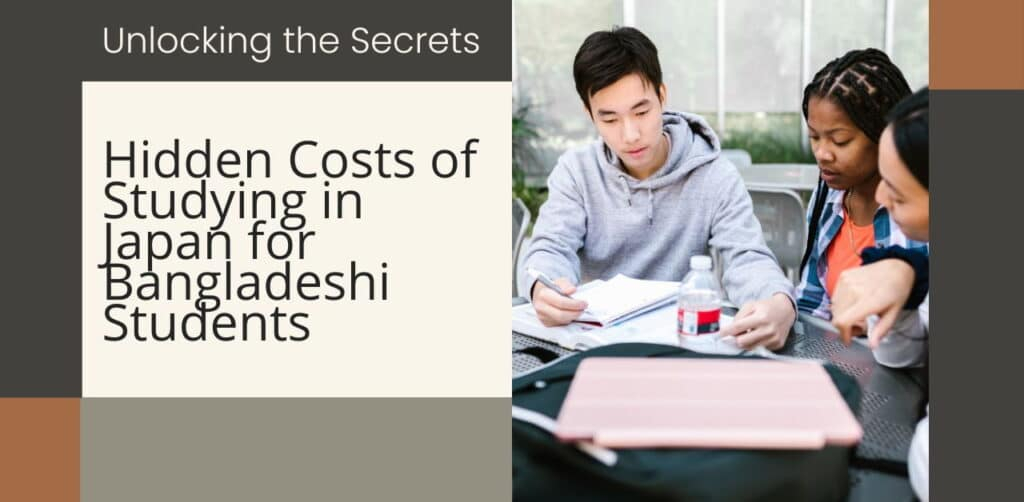Unlocking the Secrets: Hidden Costs of Studying in Japan for Bangladeshi Students

Experience the wonders of studying in Japan as a Bangladeshi student, but beware of the hidden costs that often come with it. While Japan offers an enriching educational experience, it’s essential to understand the financial implications before embarking on this journey. In this article, we will explore the undisclosed expenses that Bangladeshi students might encounter while studying in Japan.
From tuition fees to accommodation costs, there are several factors that can significantly impact your budget. Additionally, transportation, living expenses, and healthcare expenses are aspects that students need to consider. By uncovering these hidden costs, we aim to provide you with valuable insights that can help you make informed decisions about studying in Japan and plan your finances accordingly.
Whether it’s exploring the vibrant city life, immersing in Japanese culture, or pursuing academic excellence, there are incredible opportunities waiting for Bangladeshi students in Japan. However, by understanding and preparing for the hidden costs, you can ensure a hassle-free study abroad experience. Join us as we dive deeper into the secrets of studying in Japan and equip yourself with the knowledge needed to make the most of this life-changing opportunity.
Pros and cons of studying in Japan

Studying in Japan offers numerous advantages for Bangladeshi students. The country is renowned for its high-quality education system, cutting-edge technology, and vibrant culture. Japanese universities are often ranked among the top institutions globally, providing students with an opportunity to learn from world-class professors and researchers. Additionally, Japan’s technological advancements and innovation make it an ideal destination for those pursuing degrees in engineering, computer science, and robotics.
However, studying in Japan also comes with its challenges. Language barrier can be a significant obstacle for Bangladeshi students, as most courses are taught in Japanese. While some universities offer English-taught programs, they may be limited in scope. Adapting to a new culture and being away from home can also be emotionally challenging. Before setting our compass, it’s pivotal to balance the scales of advantages and drawbacks.

For Any Inquery: (880) 1930-350350
By submitting my data I agree to be contacted
Hidden costs of studying in Japan for Bangladeshi students

Tuition Fees and Scholarship Options
Tuition fees can be a significant financial burden for Bangladeshi students studying in Japan. Japanese universities often have higher tuition fees compared to institutions in Bangladesh. It’s important to research and compare the costs of different universities and programs to find the most affordable option. Additionally, exploring scholarship opportunities can help alleviate the financial strain. The Japanese government, as well as various organizations and universities, offer scholarships specifically for international students.
Living Expenses and Accommodation Costs
Living expenses in Japan, especially in major cities like Tokyo and Osaka, can be quite high. Rent, utilities, groceries, and other daily expenses can quickly add up. It’s essential to budget and plan accordingly to ensure you have enough funds to cover your living costs throughout your study period. Additionally, finding suitable accommodation can be challenging, especially for international students. Dormitories, shared apartments, and homestays are popular options, but they may come with their own costs and limitations.
Health Insurance and Medical Expenses
Health insurance is mandatory for all international students studying in Japan. The cost of health insurance can vary depending on the coverage and the insurance provider. It’s important to factor in this expense when calculating your budget. Additionally, medical expenses in Japan can be quite high, especially for non-emergency treatments. It’s advisable to have some extra funds set aside for unexpected medical costs or emergencies.
Transportation and Commuting Costs
Transportation costs can also impact your budget while studying in Japan. Public transportation in Japan is efficient and well-connected, but it can be expensive, especially for frequent travelers. Monthly or yearly passes can help reduce costs. Additionally, commuting expenses, such as traveling between your accommodation and university, should be considered when planning your finances.
Language and Cultural Adaptation Expenses
Language and cultural adaptation expenses can also be hidden costs for Bangladeshi students studying in Japan. Learning Japanese is crucial for academic success and daily life in Japan. Enrolling in language courses or hiring a tutor can incur additional costs. Furthermore, participating in cultural activities and events can enhance your experience in Japan but may require some financial investment.
Part-time Job Opportunities and Income Potential
Part-time jobs can be a valuable source of income for Bangladeshi students studying in Japan. However, it’s important to understand the limitations and regulations surrounding part-time work for international students. While Japan allows international students to work part-time, there are restrictions on the number of hours you can work per week. It’s crucial to balance your studies with work and ensure that it does not negatively impact your academic performance.
Tuition fees and scholarship options

Studying in Japan as a Bangladeshi student can be a rewarding experience, but it’s essential to be aware of the hidden costs that come with it. By understanding and planning for these expenses, you can ensure a smoother financial journey. Here are some tips for managing hidden costs while studying in Japan:
- Research and compare tuition fees and scholarship options.
- Create a realistic budget that includes living expenses, accommodation costs, and transportation.
- Consider purchasing comprehensive health insurance to cover medical expenses.
- Take advantage of part-time job opportunities while ensuring it does not interfere with your studies.
- Learn the Japanese language to enhance your academic and social life in Japan.
- Connect with other international students and seek their advice on managing hidden costs.
- Explore cost-saving options such as student discounts and budget-friendly activities.
Unlock the secrets of studying in Japan and embark on a life-changing journey with confidence. By being prepared and proactive, you can make the most of your experience while managing your finances effectively.
Now that you are equipped with the knowledge needed to navigate the hidden costs of studying in Japan, it’s time to start planning and preparing for this exciting adventure. Study hard, embrace the culture, and make lifelong memories in the Land of the Rising Sun!
_This article is a guide for Bangladeshi students considering studying in Japan. It provides valuable insights into the hidden costs associated with studying abroad in Japan, helping students make informed decisions and manage their finances effectively. From tuition fees and living expenses to healthcare and transportation costs, this comprehensive guide covers all aspects that students need to consider. By following the tips provided, Bangladeshi students can unlock the secrets of studying in Japan and have a successful and fulfilling experience._
Living expenses and accommodation costs

Studying in Japan comes with a price tag, and tuition fees are one of the major expenses to consider. Japanese universities are known for their high educational standards, but they also have higher tuition fees compared to universities in Bangladesh. It’s crucial to research and compare the tuition fees of different universities in Japan to find the most affordable options.
However, don’t let the high tuition fees discourage you. There are various scholarship options available for Bangladeshi students that can significantly reduce the financial burden. The Japanese government, as well as many private organizations, offer scholarships specifically for international students. These scholarships can cover a portion or even the entire tuition fees, making studying in Japan more accessible for Bangladeshi students.
Additionally, some universities in Japan also provide financial aid programs for international students. These programs can offer assistance with tuition fees, living expenses, and other costs associated with studying abroad. It’s essential to explore these options and apply for scholarships and financial aid programs well in advance to increase your chances of receiving support.
Health insurance and medical expenses

Apart from tuition fees, living expenses and accommodation costs can be significant factors affecting the overall cost of studying in Japan. Japan is known for its high standard of living, and the cost of living can vary depending on the city or region you choose to study in. Tokyo, for example, is one of the most expensive cities in the world, while smaller cities may offer more affordable options.
Accommodation costs can also vary greatly depending on the type of housing you choose. University dormitories are usually the most affordable option, but space can be limited, and you may need to share facilities with other students. Renting an apartment or a shared house can provide more independence but comes with higher costs.
It’s important to factor in living expenses such as groceries, transportation, utilities, and leisure activities when calculating your budget. Be mindful of your spending habits and try to find ways to save money, such as cooking at home instead of eating out frequently or using public transportation instead of taxis.
Transportation and commuting costs

Health insurance is another hidden cost that often catches international students off guard. In Japan, all residents, including students, are required to have health insurance. While some universities include health insurance as part of their tuition fees, others may require students to obtain their own insurance coverage.
It’s crucial to research and understand the health insurance options available in Japan and ensure that you have adequate coverage. Without proper insurance, medical expenses can quickly add up in case of illness or injury. Additionally, it’s important to familiarize yourself with the healthcare system in Japan, including the process of making appointments, visiting doctors, and getting prescriptions.
Language and cultural adaptation expenses

Getting around in Japan can be convenient and efficient, thanks to its extensive public transportation network. However, transportation costs can still be a significant expense, especially if you need to commute daily between your accommodation and the university.
Consider the location of your accommodation in relation to your university and the availability of public transportation options. Living closer to the university can help reduce commuting costs and save you valuable time. Additionally, it’s worth exploring student discounts and commuter passes that can provide cost savings on train and bus fares.
Part-time job opportunities and income potential

While studying in Japan, you will be exposed to a new language and culture, which can be both exciting and challenging. However, language and cultural adaptation expenses should be taken into account when planning your budget.
Investing in language classes or language learning resources can help you overcome the language barrier and enhance your overall experience in Japan. Additionally, participating in cultural activities and events can enrich your understanding of Japanese culture, but they may come with associated costs, such as entrance fees or transportation expenses.
It’s important to strike a balance between immersing yourself in the local culture and managing your expenses. Look for free or low-cost cultural activities and events organized by your university or local communities to make the most of your cultural experience without breaking the bank.
Conclusion and tips for managing hidden costs
To offset some of the hidden costs of studying in Japan, many international students choose to work part-time. Japan offers various part-time job opportunities, especially in industries such as hospitality, retail, and tutoring.
Before taking up part-time work, it’s essential to familiarize yourself with the regulations and restrictions imposed on international students. The Japanese government has specific rules regarding the number of hours international students can work per week to ensure that their studies are not compromised.
Working part-time can provide you with additional income to cover your living expenses or save for future expenses. However, it’s important to strike a balance between work and studies to ensure that your academic performance does not suffer.
